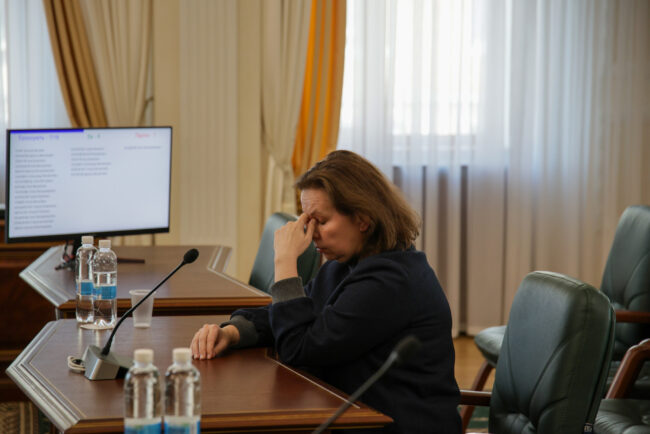KYIV, UKRAINE — It’s a quiet room. The people who bothered to show up are distracted: fidgeting, whispering or gazing at their phones. A hoarse voice drones for nearly half an hour, reading from a disciplinary case examining the behavior of a judge.
This is Ukraine’s highest judicial oversight body, the High Council of Justice. Just 15 of the 21 seats reserved for judges are filled. The empty chairs speak volumes about a system in crisis.
The council, established in its current form in 2016 to reform a judiciary plagued by corruption and inefficiency, is now faltering. Decisions are rushed or delayed, judges accused of serious misconduct remain on the bench, and public confidence is fading fast.
While the council is meant to appoint and discipline judges, review cases of misconduct and authorize arrests of corrupt officials, mounting pressure and chronic understaffing have left the council stagnant. In many cases, procedural bottlenecks and political reluctance have allowed judges accused of corruption to stay in place.
Courts under strain as vacancies mount
Across the country, judges report being overwhelmed, with many pointing to the council’s failure to appoint replacements in a timely manner.
In Kyiv’s Pecherskyi District Court, judges handle as many as 30 cases per day — far more than European norms.
“In Europe, 200 minor administrative cases a year. Here? Two hundred a month,” says Judge Vitaliy Salikhov.
One in three judicial seats in Ukraine remains vacant. In 2024 alone, more than 500 judges retired or resigned, while just 470 were appointed. The shortfall compounds each year, leaving the remaining judges burdened and burned out.



Leadership gaps and missed opportunities
Critics say the council’s leadership is part of the problem. Many see Chair Hryhorii Usyk as detached and unresponsive.
“Uysk only moves when pushed — or when things are on fire,” says a senior council member who spoke on condition of anonymity. Even at national events, the source says, Uysk’s chair is often empty. “That’s unacceptable.”
Activists from the nonprofit Dejure, which monitors Ukraine’s judiciary, say Usyk has made only a handful of public appearances since taking office more than two years ago. In response, Usyk told Global Press that he participated in over 100 events in 2023 and 2024, and that key decisions were regularly published in press releases.
The council’s official website tells a different story: Of the 41 publicly documented events involving Usyk, only 12 were meetings focused on judges’ concerns. The rest were primarily with international stakeholders like the Council of Europe or the European Union.
Judge Oleksandr Sasevych, who challenged Usyk for the chairmanship, says the disconnect between the council and Ukraine’s judiciary is growing.
“People are waiting for us,” he says. “And these visits — direct conversations with judges and local authorities — could have prevented many of the complaints we later have to review.”



Tensions with anti-corruption agencies
Some judges also see interference from other government anti-corruption bodies. Several have filed complaints against the National Anti-Corruption Bureau, but those investigations have yielded results. Council member Roman Maselko cites the case of Ilia Lonskyi, a district court judge in Odessa who accused the bureau of illegal persecution after a search of his office.
“But it turned out that this is exactly how he was caught taking a bribe,” Maselko says.
In other instances, the HCJ works with other anti-corruption bodies. In Sumy, a city in northeastern Ukraine, Judge Oleksandr Kovtun reported a document ostensibly showing a court decision circulating on Telegram following his ruling in a drunk driving case. The document bore clear signs of forgery — a strange barcode, incorrect seal and a falsified signature.
Kovtun reported the forgery to the Prosecutor General’s Office and the council, warning that such fabrications undermine trust in the courts and signal that verdicts can be bought. A criminal investigation was opened in early June.



Citizens pay the price for judicial paralysis
As the council flounders, Ukrainians must navigate an inconsistent and politicized judicial system.
Activist and blogger Oleksandr Novokhatskyi, a former officer in Ukraine’s Security Service, says he was targeted after criticizing the government on YouTube — a video that drew hundreds of thousands of views.
Soon after, security agents raided his home. He now faces charges of justifying Russian aggression — an offense punishable by up to eight years in prison.
But Novokhatskyi’s deepest concern is the judge assigned to his case: Tetiana Ovsepyan, who handed down sentences against protesters during Ukraine’s 2014 Revolution of Dignity.
“If she ruled against activists in 2014, what would stop her from doing it again, against me?” he says. After all, like those activists, he had been openly critical of the government.
Without urgent reform and stronger leadership, Ukraine’s judiciary risks slipping further into dysfunction. The High Council of Justice, designed to safeguard judicial accountability, now appears gridlocked — unable to fulfill its mandate or restore public trust.
For Novokhatskyi, and millions of Ukrainians, the courts offer not a path to justice, but a maze of delay and doubt.

